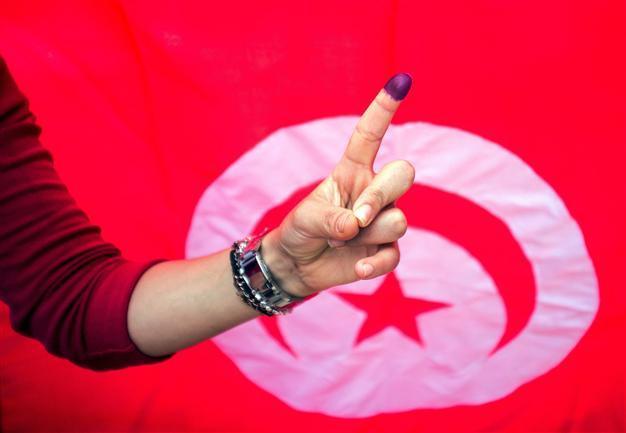Tunisia awaits results as secular party claims win
TUNIS - The Associated Press / Agence France-Presse

A Tunisian woman shows her ink stained finger after voting at a polling station in Ben Arous, Oct. 26. AP Photo
Tunisia's main secular opposition party is claiming a big victory in the country's historic election over the once dominant Islamists.
Partial results from the official election commission are expected to be released throughout the day Oct. 27, but the Nida Tunis (Tunis Calls) party has cited exit polls to say it has won around 80 seats, more than any other party in the 217-member parliament.
The election will produce the nation's first five-year parliament following the country's 2011 Arab Spring revolt.
Nida Tunis includes businessmen, trade unionists and many politicians from the deposed dictator Zine El Abidine Ben Ali's government.
It focused its campaign on defeating the moderate Islamist Ennahda Party, which governed Tunisia through a turbulent period marked by economic problems and rising extremism.
"We have positive indications that Nidaa Tounes (Call of Tunisia) could
be leading," party leader Beji Caid Essebsi, an 87-year-old veteran of
Tunisian politics, told reporters.
Analysts predicted no single group would win the outright parliamentary majority needed to govern alone.
Ennahda declined to offer a forecast ahead of the official results but its leader Rachid Ghannouchi put the emphasis on consensus.
"Whoever comes out top, Nidaa or Ennahda, the main thing is that Tunisia needs a government of national unity, a political consensus. This is the policy that has saved the country from what other Arab Spring countries are going through," he told Hannibal television.
The body organising the election could give partial results on Oct. 27, but it has until October 30 to announce the final outcome. It gave the provisional turnout as 61.8 percent.
Some 80,000 security forces were deployed to avert extremist attacks on polling day, which passed without major incident, as some three million from an electorate of five million people voted for a 217-seat parliament under a new constitution drafted in January.
U.S. President Barack Obama hailed the vote as "an important milestone in Tunisia's historic political transition."
Tunisia is seen as a beacon of hope compared with other chaos-hit countries like Libya and Egypt, where regimes were also toppled during the Arab Spring of three years ago.
But its transition has been tested by militant attacks and social unrest, while poverty and unemployment, which were key factors that sparked the 2011 revolt, remain unresolved. The whole campaign was fought on the axis of the economy and security.
La Presse de Tunisie, the country's main French-language newspaper, said the election was a major achievement on the path to establishing stable institutions in the former French colony.
"The mission is almost accomplished, which is considerable," it said in a commentary.The government had warned of possible jihadist attacks after a standoff on Friday between police and suspected militants near Tunis that killed a policeman and six suspects, five of them women.
Giving a stamp of approval, the head of the EU's election observer mission, Annemie Neyts-Uytterbroeck, said voting had been "more than satisfactory."
An array of parties competed for seats in the new parliament, some fronted by stalwarts of veteran dictator Zine El Abidine Ben Ali who was toppled in 2011.
His ouster ushered in a coalition government and interim president that won international praise. But the birthplace of the Arab Spring protests has flirted with disaster.
A rise in militant activity last year when two opposition lawmakers were assassinated by suspected Islamists - long suppressed under Ben Ali - threatened to derail the road to democracy.
Critics accuse Ennahda - Tunisia's leading party - and its secular allies, which have been running the country, of failing to address people's security needs or shore up the economy.
Ennahda has proposed the formation of a government of national unity and has not put forward a candidate for a November 23 presidential election, keeping its options open over whom it will back.
